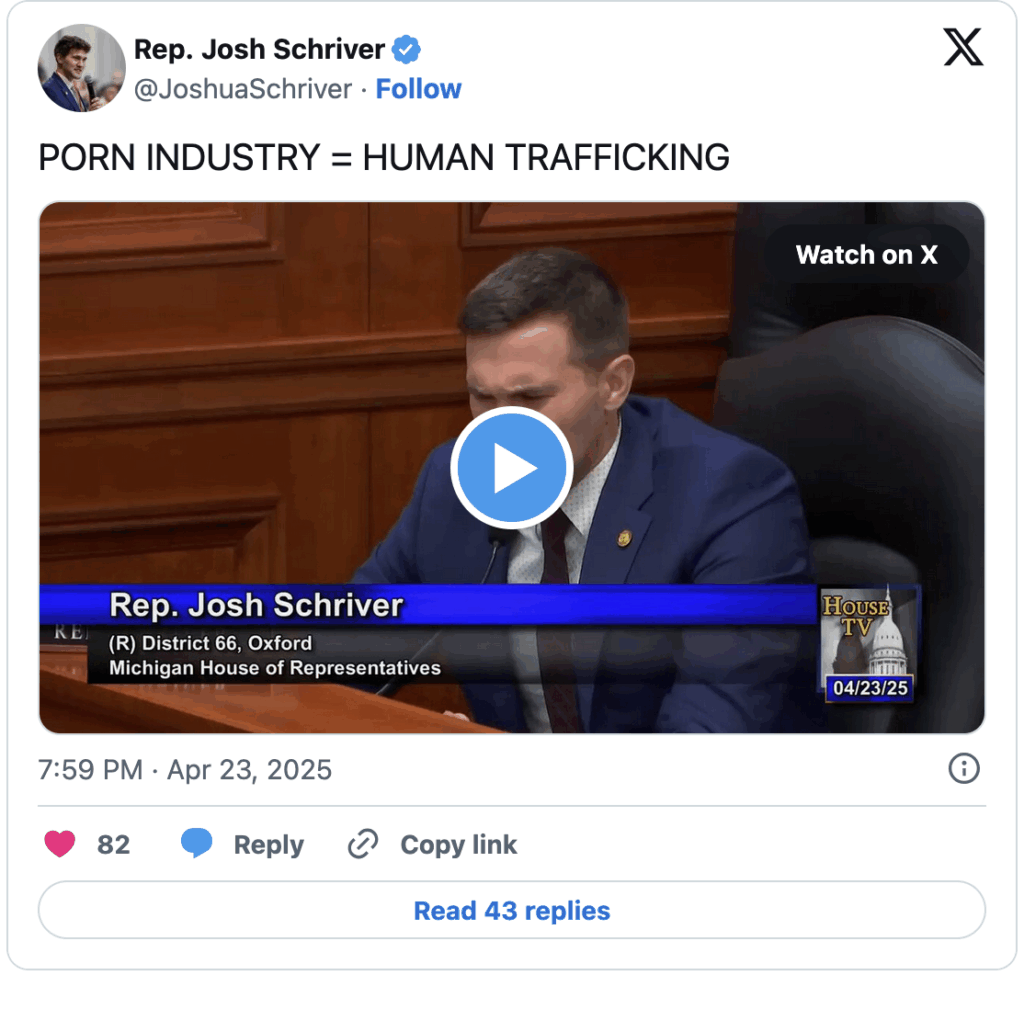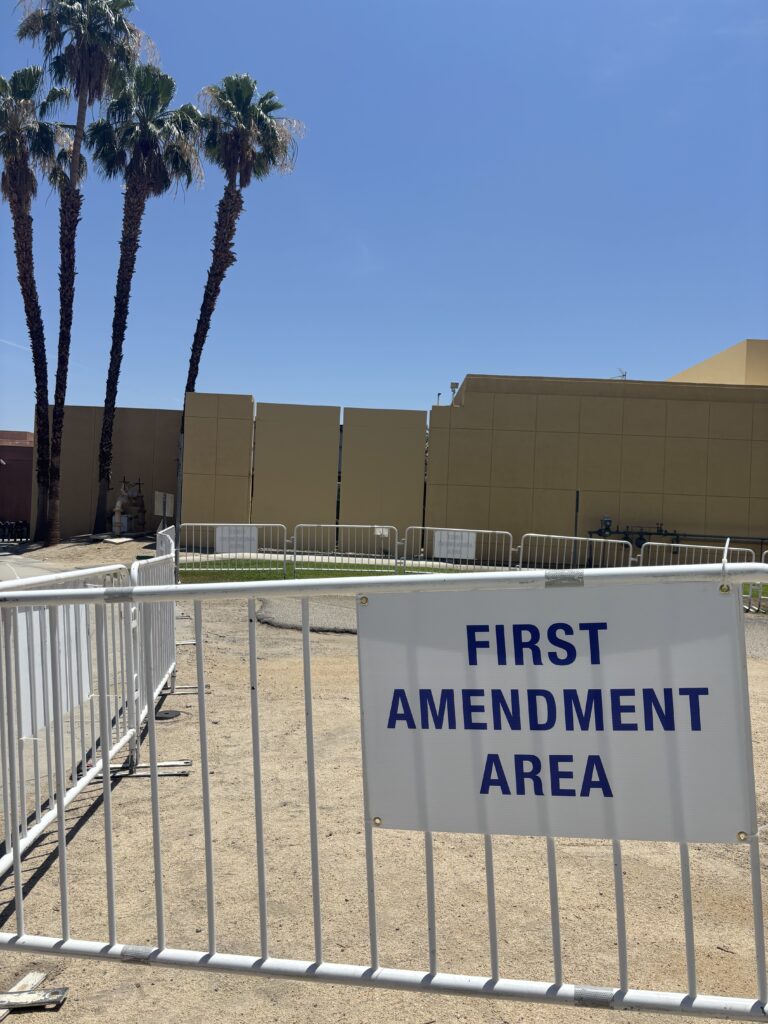Michigan Anti-Porn Bill Would Criminalize ASMR, Written Erotica, and Even Nonsexual Depictions of Trans People
Under the law, transgender people writing about their gender identity online could face 20 years in prison and a $100,000 fine.

An "Anticorruption of Public Morals Act" sounds like something out of the Victorian era. But far from the brainchild of Comstock-era Progressive scold, it's a new bill in Michigan. Introduced September 11 by state Rep. Josh Schriver (R–Oxford), the act would ban the online distribution of material "that corrupts the public morals."
The legislation—House Bill 4938—defines such material as any "depiction, description, or simulation, whether real, animated, digitally generated, written, or auditory, of sexual acts." Distributing it would be a felony crime, punishable by up to 20 years in prison and/or a fine of up to $100,000. Individuals, commercial entities, internet platforms, and public institutions could all be held criminally liable.
You are reading Sex & Tech, from Elizabeth Nolan Brown. Get more of Elizabeth's sex, tech, bodily autonomy, law, and online culture coverage.
A Broad Ban on Depictions of Sexuality
The banned content here would clearly include all pornographic images and videos.
But the bill has larger designs. Its definition of the prohibited materials is written broadly enough to ban literature with sexual themes, video games and movies with sex scenes, hand-drawn erotica, and much more.
The bill's definition of "sex acts" includes not just things that are obviously sex acts (vaginal or anal intercourse, fellatio or cunnilingus, etc.) but things merely connected to sexuality, including BDSM and "erotic autonomous sensory meridian response content, moaning, or sensual voice content."
Under this rubric, everything from 50 Shades of Grey to When Harry Met Sally would be criminalized.
And just in case some sort of sexuality could slip by under that rubric, the measure also bans "any other pornographic material," a category that includes anything designed "to sexually arouse or gratify, including videos, erotica, magazines, stories, manga, material generated by artificial intelligence, live feeds, or sound clips."
An Attack on Queer and Trans Culture
Like so many GOP measures disguised as purely anti-porn actions, the Anticorruption of Public Morals Act also takes aim at transgender people, people with non-binary gender identities, drag queens, and any other deviation from traditional conservative conceptions of gender.
Among the prohibited content in Schriver's bill: any "depiction, description, or simulation, whether real, animated, digitally generated, written, or auditory, that includes a disconnection between biology and gender by an individual of biological sex imitating, depicting, or representing himself or herself to be of the other biological sex by means of a combination of attire, cosmetology, or prosthetics, or as having a reproductive nature contrary to the individual's biological sex."
This would criminalize basically all depictions or discussions of transgender people. By so much as writing or posting pictures of themselves, a trans person could face felony charges. So could anyone distributing books such as Deirdre McCloskey's Crossing: A Memoir (or this Reason magazine article about McCloskey's transition), or sharing clips from TV shows such as Euphoria or Transparent.
The only explicit exception laid out is for "material to be used for scientific and medical research or instruction" and "peer-reviewed academic content."
A Ban on VPNs
The Anticorruption of Public Morals Act is stunning in its authoritarian scope.
The bill wouldn't merely criminalize distribution of prohibited content. It contains a provision saying that internet service providers must "implement mandatory filtering technology to prevent residents of this state from accessing prohibited material."
With this provision in place, the state wouldn't have to actually litigate—and prove in court—that various content rightly fell under the state's prohibition. It could simply scare internet service providers into preemptively blocking anything that could conceivably raise alarms, likely casting a much wider net than technically required by the law.
Under the bill, internet service providers would also have to "actively monitor and block known circumvention tools."
That means virtual private networks (VPNs)—which could let people get around the state's censorship regime—would also be banned, even though people use VPNs for many purposes (including connecting securely to company or university computer networks remotely). Promoting or selling "circumvention tools" would also be a crime.

Internet service providers and other companies that facilitate access to any sort of prohibited material could face a fine of $500,000 per violation.
OK, but—the First Amendment
Schriver's bill does say that it applies only to "material that at common law was not protected by adoption of the First Amendment to the Constitution of the United States," which at least recognizes that the First Amendment exists. But that suggests that the only sexually oriented speech that would be OK under this bill would be speech legally unobjectionable in the 1700s.
This is not how First Amendment jurisprudence in the United States works, of course. You can't just say "let's pause at 1791," or at 1865, or at any other point in history. You are stuck with the free speech precedents that have evolved—not always in a linear fashion—over time, up to this day.
And the Anticorruption of Public Morals Act very clearly violates those precedents.
Fortunately, right now, it's merely resting with the Michigan House Judiciary Committee and may move no further.
But this is not merely one man's nutty authoritarian fantasy. The "Anticorruption of Public Morals Act" has already attracted five additional cosponsors, all Republicans.
This bill—and others popping up in other state legislatures—show where a lot of Republican fervor is right now.
We're in an era when conservatives feel comfortable expressing disdain for the First Amendment. An era of not just reawakened antipathy toward pornography but attempts to define porn as basically anything with sexual themes. And an era when attacks on transgender rights and attempts to enforce rigid gender norms and conventions are dressed up as attempts to combat obscenity.
All three of these disturbing tendencies are on display in the "Anticorruption of Public Morals Act." Even if this legislation fails to advance, it's still a frightening sign of where some Republican heads are at right now.
New Missouri A.G. Continues With Age Verification Plan
Meet the new boss…same as the old boss. Former Missouri Attorney General Andrew Bailey was full of bad ideas about tech policy and determined to use his office to unilaterally craft them. Bailey proposed rules requiring social media companies to let users choose their own content moderators and to require age verification by adult websites and by the devices on which they were accessed.
Bailey said he had the authority to single-handedly declare such policies under Missouri's Merchandising Practices Act (MMPA), which bans unfair, deceptive, or fraudulent practices "in connection with the sale or advertisement of any merchandise in trade or commerce."
Bailey just left his state position to become co-deputy director of the FBI (a frightening prospect). Before leaving, he quietly withdrew the social media moderation rule, which was awaiting filing with the state legislature's committee on administrative rules. (The decision to withdraw was "not due to comments suggesting he lacks legal authority to issue the rule," his office stated with all the panache of a child taunting his parents "you can't tell me what to do.")
Bailey has been replaced by Catherine L. Hanaway. One of the first things that Hanaway—who was sworn in as Missouri attorney general on September 8—did upon taking office was go to court to defend the state's policies limiting medication abortion, even though Missouri voters approved a reproductive freedom amendment. Soon after that, Hanaway signaled her intention to keep pushing Bailey's age verification rule.
"This rule is a milestone in our effort to protect Missouri children from the devastating harms of online pornography," said Hanaway in a September 11 statement.
The proposed rule is slated to take effect on November 30. It says "the failure of an individual or commercial entity to use certain commercially reasonable age verification technology to protect minors in Missouri from accessing sexually explicit content online constitutes an 'unfair practice' under the MMPA." Furthermore, "it is an unfair, deceptive, fraudulent, or otherwise unlawful practice for any provider or operator of a mobile operating system present on at least ten million devices in the United States" to offer devices without "the capacity to provide digital age-verification identification."
"We're certainly looking at a potential challenge in Missouri," Mike Stabile of the Free Speech Coalition told St. Louis Today. "The rules were drafted without any real legislative debate or input and there are huge issues with them legally and technically."
Age Verification Laws Come to Arizona, Ohio
An Arizona age verification law takes effect on Friday. Any online publisher of material the state dubs "harmful to minors" must check user ages or face $10,000-a-day penalties in lawsuits that can be brought by parents.
The law has been sold as a way to protect children from pornography. But an example its sponsor, state Rep. Nick Kupper (R–Surprise), gave of its potential uses is telling. The Daily Independent reports that
there's a feature in his bill that doesn't exist elsewhere: Its provision giving the right to sue to parents and not to the government when a child accesses a site because there are no protections.
Consider, he said, what happens if a child accesses a site on transgender education that a parent does not consider to be appropriate and believes runs afoul of the new law.
"You get to take it to court," Kupper said. At that point it will be up to a judge to decide if what's on the site fits the definition of "harmful to minors" or is legally acceptable.
Meanwhile, an Ohio law requiring age verification for websites with material "harmful to juveniles" is set to take effect on September 30.
"This summer, Ohio legislators tucked the new law into the state's two-year budget, approved in June, after attempts to pass a porn ID bill in past years had failed," notes The Columbus Dispatch.
More Sex and Tech News
• Florida's war on porn is coming for video games.
• How AI could upend copyright law.
- A whole genre of faerie smut "is everywhere," writes Sarah Skwire. "The formula is simple: Combine the best-loved traits of J.R.R. Tolkien's high fantasy and of modern romance novels, make the characters' sex lives explicit and very detailed, and include a lot of descriptions of beautiful gowns and luxurious bathtubs." But it's also about more than that…
• An ongoing case in South Africa could end the country's criminalization of sex work. Sex workers are not being prosecuted as the case plays out, per a late August order from the National Prosecuting Authority. The suit challenging criminalization was brought by the South African Sex Workers Education and Advocacy Taskforce (SWEAT) and is scheduled to go to court in May 2026.
Today's Image

